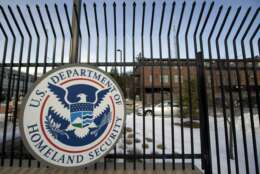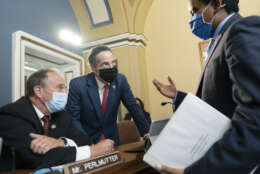Cybersecurity
-
For some perspective, Federal Drive with Tom Temin spoke with Chris Painter, the former State Department cyber diplomat, now president of the Global Forum on Cyber Expertise foundation.
August 27, 2021 -
Eric Crusius, a partner with Holland & Knight, and Ed Bassett, the CISO at NeoSystems, explain why the Defense Department’s Cybersecurity Maturity Model Certification (CMMC) effort already is having an impact on contractors.
August 27, 2021 -
The recent cybersecurity executive order looks to improve threat information sharing between the private and public sectors.
August 26, 2021 -
Under the Department of Homeland Security's new cyber talent management system, employees will have different career and promotion paths, benefits and likely higher salaries compared to their colleagues in the traditional General Schedule.
August 26, 2021 -
President Joe Biden’s recent cybersecurity executive order sets several rapid-paced deadlines for agencies to work toward adopting a zero trust posture in order to generally harden the security of the federal government. But that doesn’t mean agencies have to accomplish this on their own.
August 26, 2021 -
As the House sets new deadlines to vote on the bipartisan infrastructure bill by the end of September, here are several provisions that might impact federal employees and their agencies.
August 24, 2021 -
Michael Murray, founder and CEO of Scope Security, joined host John Gilroy on this week's Federal Tech Talk to discuss health care cybersecurity and why some devices in hospitals can be vectors for ransomware attacks.
August 23, 2021 -
This content is sponsored by Microsoft Federal. President Joe Biden’s recent cybersecurity executive order jumpstarted agencies’ efforts to modernize the government’s IT infrastructure with a set of standards that will enable agencies to proactively address…
August 20, 2021 -
This exclusive e-book highlights the ways agencies are seeking to disrupt, dismantle and limit the damage of cyber attacks.
August 20, 2021 -
Agencies often have data stored in multiple silos and data lakes, making discovery difficult. In addition, that data is rarely in standardized formats, especially with regard to formats usable by AI and ML. But by applying DevOps principles to their data strategies, they can overcome this stumbling block much quicker, facilitating implementation of AI and ML tools.
August 20, 2021 -
Recognizing supply chain attacks as a form of hybrid warfare, rethinking trust and taking ownership of the risk environment, and learning to effectively communicate critical information to supply chain partners are crucial steps in defending against this looming threat.
August 20, 2021 -
The National Institute of Standards and Technology said it isn't interested in establishing new testing or compliance regimes for software companies to conform to in implementing the president's new cybersecurity executive order.
August 19, 2021 -
The Cybersecurity Maturity Model Certification program has barely gotten off the ground, but the congressionally chartered IT Acquisition Advisory Council has partnered with the CMMC accreditation body to establish a Center of Excellence.
August 19, 2021 -
U.S. Census Bureau computer servers were exploited last year during a cybersecurity attack, but it didn't involve the 2020 census
August 18, 2021 -
Deploying coordinated disinformation and influence campaigns as a means of cyber warfare is becoming an increasingly popular tactic for nefarious agents looking to target the public sector.
August 18, 2021














